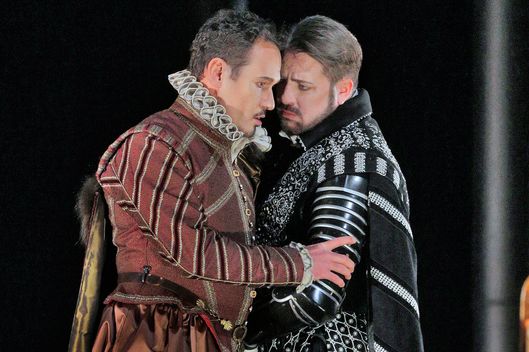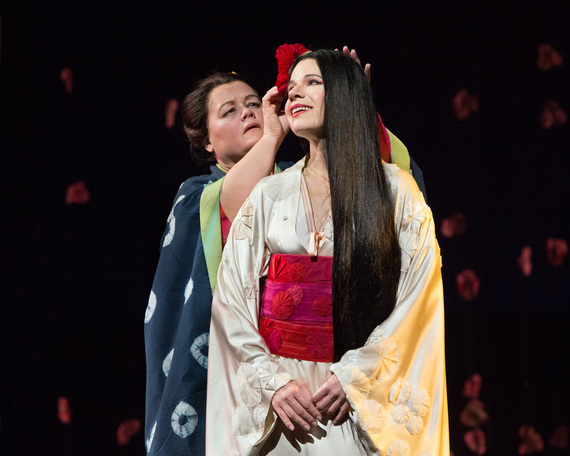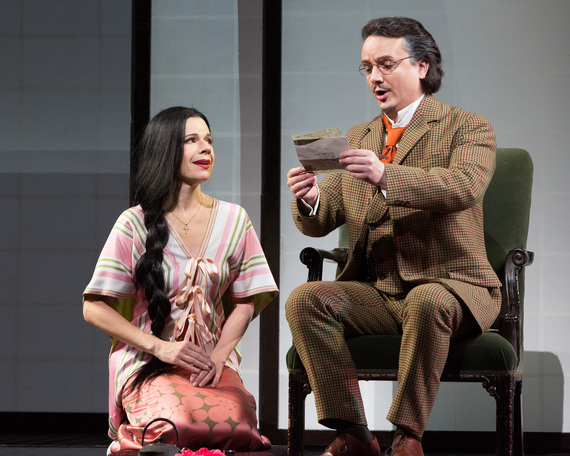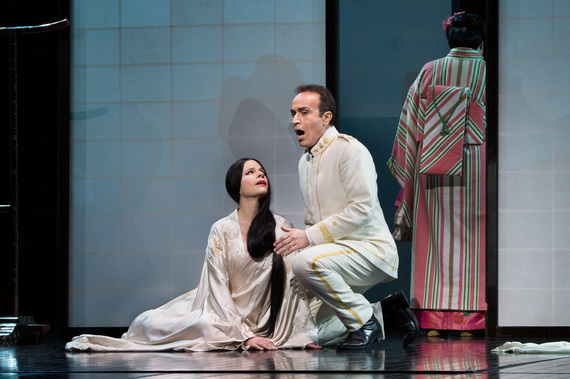
The applause and bravos for the soprano Sondra Radvanovsky were so frenzied at the end of Donizetti’s “Roberto Devereux” at the Metropolitan Opera on Thursday night that she looked overwhelmed, almost a little frightened.The audience members knew, it seemed, that they had just witnessed an emotionally vulnerable and vocally daring performance, a milestone in the career of an essential artist.
Portraying Elisabetta (Elizabeth I), Ms. Radvanovsky completes a marathon at the Met, having sung all three of Donizetti’s daunting Tudor queens in a single season. Her run began in September with a poignant, fervent account of Anne Boleyn in “Anna Bolena,” and continued in January with wrenching singing as Mary Stuart in “Maria Stuarda.”
Elisabetta may be the best match for her distinctive gifts. The opera presents the queen late in life, still regal and intimidating, yet frail, wobbly on her feet and consumed with insecurity: She believes that the younger Earl of Essex, Roberto Devereux, once her fawned-upon favorite, has been disloyal. True to form, Ms. Radvanovsky sings with searing power, flinty attack and incisive coloratura passagework. There has always been a slightly hard-edged quality to her sound that takes some getting used to. But that grainy tint suits her take on this aging queen. During moments of doubt, when Elisabetta expresses her isolation, Ms. Radvanovsky shows that she can bend phrases with aching tenderness.
For the Met’s first production of “Roberto Devereux,” the company has assembled an ideal cast and an insightful conductor, Maurizio Benini. The superb tenor Matthew Polenzani excels in the title role, his lyrical elegance matched by youthful ardor. Roberto is in trouble when the opera opens, having led a losing military campaign in Ireland. He has returned to England, where he faces charges of dereliction of duty.
Excerpt: ‘Roberto Devereux’
Matthew Polenzani and Sondra Radvanovsky sing an excerpt from “Nascondi, frena i palpiti,” the Act I duet from Donizetti’s opera, at the Met.
By METROPOLITAN OPERA on March 27, 2016. Watch in Times Video »
Roberto was once a young hothead, toying with the smitten Elisabetta’s affection. But here he is a broken man, hopelessly in love with Sara, the Duchess of Nottingham (and the wife of his good friend the Duke). Mr. Polenzani conveys the character’s remnants of feisty rebellion and frustrated yearning in a compelling performance.
The baritone Mariusz Kwiecien, singing with virile sound and soaring lyricism, captures the confusions of the Duke, shattered by personal betrayal. And it is true luxury casting to have the great mezzo-soprano Elina Garanca bring her sumptuous voice and charisma to the role of the retiring, love-struck Sara.
The staging is the latest at the Met from the director David McVicar, who also led “Anna Bolena” and “Maria Stuarda.” Mr. McVicar keeps the attention on the performances by opting for a traditional look and setting. The costumes by Moritz Junge, especially the queen’s elaborate gowns, would look at home in a Hollywood historical drama.
Mr. McVicar presents the opera as a play within a play. The production uses, essentially, a single set designed by Mr. McVicar, a first for him at the Met. It shows a spacious room in a Tudor-era palace, with dark-wood walls trimmed in gold and a profusion of chandeliers. Walls slide and reconfigure to suggest other scenes, including the Tower of London, where Roberto winds up.
Looking at that stately set all night gets a little tiresome. But with his concept, Mr. McVicar conveys the intrigues at court. Courtiers and ladies (the members of the Met chorus, excellent as always) watch what’s going on, even during intimate scenes between Elisabetta and Sara, or Roberto and Nottingham. The choristers stand at the sides of the stage, sneaking peeks, or peer down from a balcony, quick to spread gossip about the intimate life of their unmarried queen. And it’s true that a palace in Elizabeth’s day was a hard place to maintain secrets, or even to find some privacy.

Mr. McVicar also plumbs psychological undercurrents, particularly those of Roberto and Nottingham. During a crucial scene in Act I, the Duke unburdens himself to his friend, whose life is under threat from the charges he faces. He also expresses suspicions that his wife may be betraying him (not realizing that it’s Roberto who loves her). Mr. Polenzani’s and Mr. Kwiecien’s characters treat each other with a physical affection that hints of homoerotic longing.
Mr. McVicar seems on to something: Nottingham’s marriage to Sara was arranged by the queen; Sara has never loved the duke. Yet Nottingham’s security as a man, and hence his value in his beloved friend’s eyes, depends on showing that his wife is true. Roberto’s affection toward Nottingham, though genuine, is burdened by his guilt. This opera reunites Mr. Polenzani and Mr. Kwiecien, who earlier this season appeared as devoted friends in a remarkable production of Bizet’s “The Pearl Fishers,” another story in which a male bond is riven by a woman.
During the Tower of London scene, Mr. Polenzani has a chance to remind us that Roberto is the opera’s title character. On Thursday, he sang the anguished aria of despair, in which Roberto yearns for a pardon, primarily so he can prove Sara innocent of adultery, with rich colors and noble elegance. By the end of this long scene, his voice seemed to tire. Still, he finished with fearlessness and integrity.
That Ms. Garanca’s voice is so plush and velvety made her Sara a poignant counterpart to Ms. Radvanovsky’s steely Elisabetta. And the glamour she conveys so naturally suggests that this meek woman has inner will that she has yet to tap.
Met audiences can rightly complain about a company that lavishes such attention on five Donizetti operas in a single season, during which the newest work on the boards is Berg’s “Lulu,” first performed in 1937. Still, completing the Tudor trilogy is an achievement for the house, and a triumph for Ms. Radvanovsky.
Opera Review: The Met’s GlamorousRoberto Devereux

A skeletal statue with a nasty-looking scythe presides over an opera that begins with a capital crime and ends with an execution. From the opening ax-chop chords and doleful answer in the overture, we know how Roberto Devereux will end, and all the principal characters get plenty of opportunities for morbid moping along the way. Yet death is a lively, lovely presence in the Metropolitan Opera’s first-ever production of the final installment in Donizetti’s Elizabethan trilogy. An energized cast, supercharged by Maurizio Benini’s high-voltage conducting, makes mortality seem like an adventure, and pain a worthwhile trade off for so much pleasurable music.
Opera can transfigure bleak, crushing misery into a suite of sensual experiences — like the title character’s final scene in the Tower of London, in which the imprisoned Earl of Essex slips from delusional hope to resignation. With his honey-coated, spring-loaded tenor, his pliant phrasing and confident pianissimos, Matthew Polenzani turns a doomed man’s musings into an ecstatic journey. His last utterance is a cabalettamore light-filled than tear-stained, and if, on opening night, Polenzani’s voice flagged before the final exit, it felt like a reasonable exchange for all that elegant intensity.
Opera audiences crave glamour, and director David McVicar doesn’t stint. Choristers in Elizabethan dress crowd the galleries of his onstage theater, chandeliers rise and fall, and the ornamented rear wall slides back and forth, carrying its freight of menacing statues and majestic doors. McVicar is one of the relatively few opera directors who understands how music works — how much time a cadence needs to ring, how a calculated stillness can help a singer activate her voice, and how a final stomp or sweep of the arm can make it seem as if she’d been frantically pacing all along. The way this production looks makes it sound better.
The cast is a gathering of veterans. Mariusz Kwiecien and Polenzani have both been Met regulars since the 1990s, and have made the slow slog to stardom. Elīna Garanča, a more recent — and splendid — addition to the roster, sings the somewhat inert role of Sarah, Dutchess of Nottingham, so ravishingly that she makes self-pity seem like an almost attractive quality. Sondra Radvanovsky has given nearly 200 performances at the Met in 20 years, but if there were any doubts that singing Donizetti’s three queens — Anne Boleyn, Mary Stuart, and Elizabeth I — would make her the company’s unchallenged sovereign, they were dispelled by the hollering (not hers) that turned her curtain call into a cathartic release.
Elizabeth is a dour monarch, stiff and limping and desolately in love with the doomed Devereux. But Radvanovsky pours all that corseted rage into singing that floats and stings. She achieves with her voice all the wild freedom that her character is denied, and makes something splendid even of her ruthlessness and regret. Her soprano is all velvet and steel, and as she pushes up into the role’s high-altitude acrobatics, she acquires ever more infallible poise. It’s a great moment in opera when she enters encased in a marble-white outfit sculpted by costume designer Moritz Junge, a pair of gauzy butterfly wings framing her auburn curls and chalky face, to deliver her aria of martial love “Ah! ritorna qual ti spero.” Later, when she is shorn of wig, collar, and gown, and reduced to the aspect of a frail old lady, she wields Donizetti’s music like a whip, urging the opera to its electrifying end. Death, be proud.
Roberto Devereux is at the Metropolitan Opera through April 19.



